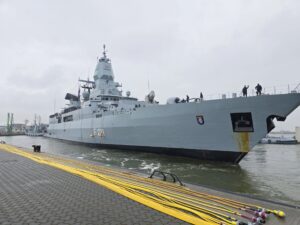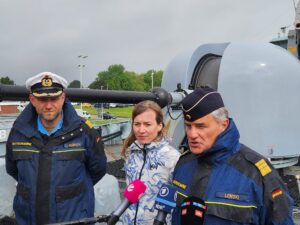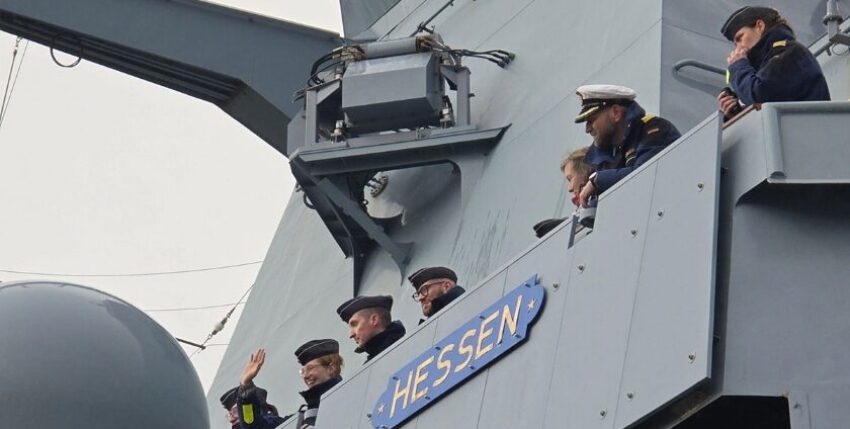
The frigate "Hessen" has been back in her home port of Wilhelmshaven following her deployment in the Red Sea as part of EU Operation ASPIDES.
It was actually the same as always when the ship came in: Relatives on the exceptionally crowded pier, waving, loud shouts of "there he is", posters and whole families. And yet the moving atmosphere was mixed with an undertone that could be described as "relief". In two respects. Firstly, the "Hessen" has been in operation almost continuously since last year, as the men and women were only granted a short break at Christmas. Secondly - and this is new - it is a relief that all the servicemen and women in the crew, the embarked personnel and other units involved, from the naval battalion to the naval aviators, are back safe and sound. It is the end of a mission for which one had to have respect. There was applause, which is also remarkable.
It is day 142 of the crisis in the Red Sea and one day after the Houthis threatened to extend their attacks to the Mediterranean. The "Hessen" had been in the EU-led operation to protect civilian shipping in the sea area threatened by drone and missile attacks for a good 56 days. In the early morning of 20 April, the relieving "Air Warning White" put an end to the "fierce campaign", as Vice Admiral Jan C. Kaack put it in an interview on a Bundeswehr portal before the ship sailed.

By then, it had been 58 days (according to Parliamentary State Secretary Siemtje Möller at the press conference) under constant threat, on permanent alert, under constant physical and mental strain, with no let-up in vigilance. According to official figures, the "Hessen" provided escort for 27 merchant ships. Four attacks were repelled.
It is too early to summarise at this point - it would also be inappropriate. The navy has long since begun to come to terms with the situation. The process of 'lessons identified' is rightly taking place internally. This takes time. We were assured in Wilhelmshaven that the frigate "Hamburg", which will be the German participant in Operation Aspides from August, is already working with the experience gained by its sister ship.
In view of the lack of presence of political representatives - we count State Secretary Möller as a representative of the Federal Ministry of Defence, i.e. as a superior - on the return of a ship from the "first combat mission of the German Navy since its foundation in 1956" (quote from bundeswehr.de), the question arises as to the security policy processing.

Photo: Potthoff
Elsewhere, we have already raised the question of whether the German public will be able to categorise the mission at all. The conversations we had with family members under the umbrella during the mooring confirmed this view. The returnee would have been all the more deserving of the presence of representatives of the people who like to attribute the Bundeswehr with the title of parliamentary army. Especially as the geopolitical situation is not getting any easier. Just looking at the Red Sea: the crisis there has led to disruptions in global shipping. Sailing around Africa leads to longer transit times, logistical challenges and greater environmental pollution. According to their own statements, the Houthis claim to have fired over six hundred missiles and drones against ships. This is roughly in line with the incident statistics of the Military Times (marineforum.online reported elsewhere), which also records enemy approaches to merchant ships and the units of Operation Prosperity Guardian protecting them - primarily US destroyers of the Arleigh Burke class - including the stocks on land destroyed by US/UK air strikes. In contrast, the statistics compiled by the EUNAVFOR Aspides mission record only 17 actual attacks on its units.
In the weekly rally on 3 May, the Houthis called for a fourth escalation stage and announced attacks in "every accessible area", i.e. within the range of available weapons. This was interpreted by the media as meaning that the attacks could now also be directed against ships in the eastern Mediterranean. In fact, an attack on the container ship "MSC Orion" in the Indian Ocean was recorded on 30 April, around 300 to 400 nautical miles away from Yemeni rebel areas (source: Reuters). This means that the attacks by the militia group have reached a new level.

In the media, the withdrawal of the German frigate has been linked to possible bottlenecks in the protection of merchant ships in the Red Sea. The commander of the operation, Greek Rear Admiral Vasileos Gryparis, will only have three frigates at his disposal in the coming months, wrote Der Spiegel.
According to the commander of the operation, Greek Rear Admiral Vasileos Gryparis, three frigates will be available in the coming months.
Gryparis had denounced operational bottlenecks following the withdrawal of the German frigate "Hessen". Nevertheless, the Italian lead ship "Virginio Fasan" (F 591), the Greek frigate "Hydra" (F 452), an unnamed French frigate and, since 4 May, the Belgian frigate "Marie-Louise" (F 931) are currently at Aspides. The Dutch Navy will deploy the multi-purpose supply ship "Karel Doorman" (A 833), which will be used for the US-led Operation Prosperity Guardian. With a daily volume of 35 to 40 merchant ships, a maximum of four escorts can be carried out simultaneously. This may not seem like much. But it is relativised by the fact that the Houthis do not aim at every target.
Text: Mergener / Schlüter Photos: Mergener / Potthoff







